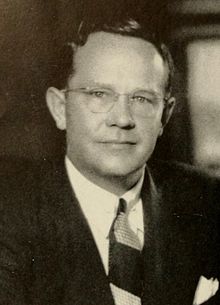Clarence W. Meadows
| Clarence Watson Meadows | |
|---|---|

Meadows from The Monticola, 1948
|
|
| 22nd Governor of West Virginia | |
|
In office January 15, 1945 – January 17, 1949 |
|
| Preceded by | Matthew M. Neely |
| Succeeded by | Okey L. Patteson |
| Attorney General of West Virginia | |
|
In office January 18, 1937 – May 25, 1942 |
|
| Preceded by | Homer A. Holt |
| Succeeded by | William S. Wysong |
| Personal details | |
| Born |
February 11, 1904 Beckley, West Virginia |
| Died | September 12, 1961 (aged 57) Clifton Forge, Virginia |
| Political party | Democratic |
| Spouse(s) | Nancy Massie Meadows |
| Profession | Politician |
| Religion | Baptist |
Clarence Watson Meadows (February 11, 1904 – September 12, 1961) was the 22nd Governor of West Virginia from 1945 to 1949.
Meadows was born and raised in Beckley. As a youth, he showed a passion for public speaking, and his parents attempted to direct him toward a career as a Baptist minister. However, Meadows was instead drawn toward the stage and, after receiving a degree from Washington and Lee University, he became active in his hometown's theater troupe. Meadows received a law degree from the University of Alabama in 1927 and subsequently entered into an active career in politics. In 1930, Meadows won in his first run for elective office, as he entered the West Virginia House of Delegates for a single term. He chose not to run for reelection, but instead successfully earned a position as Raleigh County District Attorney. In 1936, Meadows entered state politics, with the first of his two terms as West Virginia Attorney General. Because of his cantor and honest disposition, Meadows became one of the most respected politicians in the state. In 1942, he accepted an appointment as a judge for the state's Tenth Judicial Circuit.
Using a then-modern campaign that featured an array of radio appearances, Meadows was easily elected governor in 1944. As governor, his priorities included ameliorating labor strife in the coal industry, increasing access to quality education, and improving transportation to the geographically isolated state.
At the conclusion of his term, Meadows returned to his law practice. In 1957, he retired to Florida and assisted Democrats in his new state with campaigning. He died in 1961 while visiting relatives in Clifton Forge, Virginia.
...
Wikipedia
